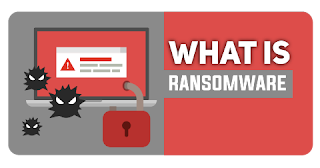Learn about Ransomeware and How does it works
So, In recent years there is a lot of buzz about Ransomware.
In fact on Friday 12th May,2017 The NHS (National Health Services) in UK reported a large-scale cyber attack that forced them to shut down their entire IT systems and postpone all non-urgent activity across the country. The attack is believed to be the result of"ransomware", a kind of malware that been employed by computer hackers for several years to capture information, extort money or force people or organisations to behavepppp in certain ways.
How does Ransomware work?
Ransomware gains access to a computer an equivalent way as any quite virus or computer worm - either through getting the user to open an infected email, navigate to a compromised website or install an infected program. Once inside a computer it can add a several alternative ways .
One of these is to bombard users with adverts,indecent images or bogus warnings until they pay to possess them removed. Alternatively, it can lock users out of 1 or more parts of their PC until they pay to possess access restored. Sometimes it does this by mimicking an official warning from a government agency or police force.
Victims are often given a time limit within which they have to pay and ransoms can vary in price from tens to hundreds of pounds. Often ransoms are demanded in an untraceable cryptocurrency, such as Bitcoin, to make them harder for law enforcement to trace.
Should the ransom ever be paid?
No. Never. Paying it'll just be the beginning of your problems– remember that the people that do that are criminals.
Some ransomware operators will refuse to unlock your device even after you've paid, and demand more money or attempt to defraud you by other means with the financial information you've provided them. The problem is that the more people pay the ransom, the more of an incentive cybercriminals need to use this system since it offers"easy profit".
So, It's better to backup your files and use strong antivirus software instead.
How Ransomware can be removed?
Removing any kind of malicious code depends predominantly on what kind of system a company or organisation is using. Outdated operating systems may be easier pray to hackers because their security certificates have lapsed.
The most basic level of ransomware could be removed by putting Windows in Safe Mode and using an antivirus program to find and delete the software. Failing that, there is a tool in Windows called System Restore that rolls back the operating system to a earlier date. It affects any and all system files and programs that have been installed or changed since that date - reverting them back to the stage they were at on that day.
The System Restore option is found in a computer's boot menu before Windows is loaded when you power on the machine. But for larger, industrial attacks involving networks of computers, finding the solution is a lot more complex.
Can the files be recovered?
Unfortunately, if a serious ransomware virus has already infected and encrypted certain files, it's not possible to recover them.
The decryption key is held by the cybercriminal and the algorithms themselves are too complex to break. Paying the ransom can be risky as cybercriminal scam always choose not to release the hostage files.
What to do to protect yourself from Ransomware?
You need to have good, off-site backup. And if you're a business then it's really important to have a really well thought-out backup plan. As medical doctors suggests care is better than cure. If you like this post, Dont forget to Read other post given Below.
Also Read: Install T-Phish in Termux





0 Comments:
If you have any query or want to know something please comment